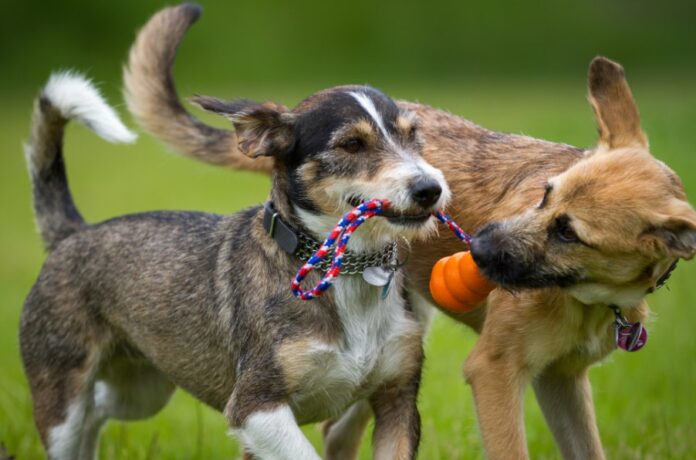Getting your dog to bond with you and learn what is normal in your household can begin when they are a puppy. Learning how to socialize your puppy the right way will help with obedience and teach them what they can and cannot get away with.
So, how do you properly do puppy socialization? Here are a few tips you need to know about socializing with your puppy.
Introducing Your Dog to New People, Animals, and Environments
Introducing your dog to new people, animals, and environments is the best way for your pup to be comfortable and happy in a variety of settings and situations.
When socializing your puppy, it is important to make sure that the environment is safe and stress-free, as well as to be patient and slow in introducing them to new experiences. You should always let your pup explore and investigate on their own.
It is also helpful to socialize in groups, as the presence of other dogs can be reassuring to the pup and give a more controlled, safe environment. Taking your puppy out to the parks, doggy day care and visits with family and friends can all help your pup.
With this, they become comfortable and happy with certain environments and people. Socializing is a key part of puppy development. It can help foster a positive relationship between your dog and the world around them.
Start Training Early
Preferably, bring your new puppy to one-on-one training and puppy playgroups. This will help them become familiar with all types of people, places, and experiences. Puppies should also be exposed to new, unfamiliar sounds, smells, and textures.
To ensure success, start with short bursts of interactions. As your pup grows more comfortable, you can increase the duration of their socialization time.
Regularly exposing your pup to these environments can help shape their career as a well-socialized adult dog. Keeping a positive attitude and rewarding your pup for proper behaviors will only encourage them.
Try searching online for training classes for more exposure to different environments. By exposing them to the best dog trainers, your pup will be social in no time. Several dog training types can help them socialize. This can include:
- Puppy Play Dates
- Puppy classes
- Walks in different places
- Visits to pet-friendly stores
- Activities such as agility, herding, and rally
All of these socialization experiences are important to allow your puppy to interact with a wide variety of people, animals, and situations so they grow up to be well-adjusted, social, and confident when they approach new situations.
If a puppy has only limited interactions they may grow anxious, fearful, or even aggressive when encountering anything unfamiliar.
Understanding Socialization – Age Gaps
Socialization is the process of helping puppies become comfortable and confident in their environment and is best achieved before 16 weeks of age. The socialization age gap refers to the age range in which puppies are most open to new experiences and learning.
This window typically lasts from 8-10 weeks, and by the time puppies reach 16 weeks of age, new experiences can become a bit of a challenge or even frightening to them.
To socialize your puppy, try introducing him to different kinds of people, places, and experiences during this window. This could include a weekly petting session with a close friend and exposure to new situations such as car rides and visits by strangers.
With the right experiences, your puppy will be comfortable in any situation.
Use Positive Reinforcement
When socializing with your puppy, positive reinforcement helps your puppy become more well-rounded and confident. Positive reinforcement can help your puppy learn desired behaviors.
Giving your puppy treats and verbal praise while they complete desired activities will help them understand they’re doing something right. Make sure to create an environment where your puppy is comfortable – reducing noise, other pets, and potential stressors.
This can be incredibly important. If you experience aggression or fear, respect the emotions your puppy is feeling and never force participation. Positive reinforcement can help them feel safe and secure in their environment.
Provide Appropriate Supervision and Guidance
When your puppy is engaging in socialization activities, such as meeting other people and dogs, it is important to give supervision for their safety, as well as to give guidance and proper feedback.
Establishing a strong foundation of trust and security can help dogs learn how to interact with people and other animals. Monitor your puppy’s environment and the situations they are in. If the situation is too stressful, find the source of the fear.
Remove the puppy from the situation, and take time to comfort them before continuing socialization activities. Provide your puppy with plenty of opportunities to play and explore, while offering support in unfamiliar environments.
Through patience, proper guidance, and lots of praise and rewards, your puppy can learn to trust and bond with you.
Overcome the Challenges
To overcome the challenges of socializing with your pup, first, remember to keep things positive. Get plenty of treats and create a comfortable, safe place for your pup to interact with other animals and people.
This can help them gain familiarity with different sights and sounds. Finally, be patient, and remember that your pup’s learning curve might not be as fast as others. Start slow and be sure to reward them for positive behavior.
Learn Puppy Socialization Techniques Starting Today
Puppy socialization is largely based on patience, consistency, and trust. Always remember to give positive reinforcement and avoid harsh corrections. When done correctly, socialization will ensure your puppy is prepared for any situation.
With all this information, you’re ready to get started! Ready to socialize with your puppy? Check out our Resources page for more information.
Did you find this article helpful? Check out the rest of our blogs!










